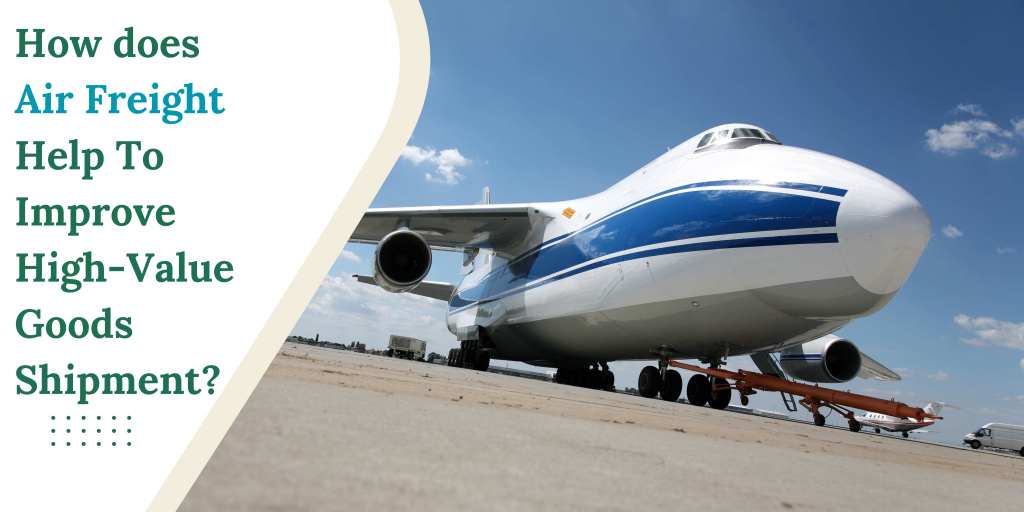How Does Air Freight help To Improve High-Value Goods Shipment?
Unless the high-value goods are shipped by air, business is likely to be delayed. Make sure to keep in touch with air freight forwarders for efficient services.

One of the most important shipping commodities is high-value goods, which need to be handled with extra care. Any unplanned event, like cargo being transferred between carriers or loading bays, could throw your air freight timetable off course. delay in customs warehousing or detention of cargo during customs clearance A manager of logistics solutions would have nightmares from that alone! The answer is to have complete control over the transit of your merchandise from door to door while avoiding unforeseen charges.
Continue reading to find out how to make delivering expensive and valuable goods more secure, less stressful, and certain to please your clients.
Please take note that while discussing high-value or valuable goods, it is important to distinguish between valuable cargo as defined by IATA (i.e., cargo valued at above USD 1000 per kilogramme) and high-value products that do not come under IATA's definition. Which type of shipment you need will depend on your product and your unique requirements. The services for precious items, such as watches, jewellery, or bank documents, are at a premium price and will, therefore, receive even greater security standards and escort service. These items are valued at above USD 1000. We advise talking to your air freight forwarder licensed in Sydney about your unique merchandise. The following suggestions can be taken into account for both categories.
1) Package Products Safely.
Packing your valuable air cargo to withstand rough handling can help prevent theft and damage. Cargo is easier to handle when it is well-packaged. While airlines try their best to use automation and the right handling tools when managing expensive cargo, your packing is also very important. For instance, forklifts or other types of equipment cannot move your goods if they are not palletized or are inherently unstable. This implies that manual handling may be necessary, which raises the possibility of damage from improper handling. Put tamper-evident packaging to use. This type of packaging has a barrier or an audible or visual indicator that it has been opened. To avoid drawing further attention, utilise packaging that does not reveal what is within.
To ensure that items are packaged in a way that allows for the most effective mechanical or automated handling, make sure you understand the packing rules for your preferred air freight forwarder. Keep a close eye on your freight route.
2) Select Direct Flights To Prevent Damage From Repeated Handling.
Multiple trans-shipment locations and a lengthier transit time are involved with long air freight routes with many destinations.
Compared to regular direct flights, airlines are likely to offer their lowest rates for these routes. This pricing disparity may be so alluring that a logistics manager will neglect to scrutinise the finer points of the end-to-end route. Remember that touching your cargo more than once increases the risk of damage during multiple loading and unloading procedures while it is in transit. Give safety a priority and try to steer clear of sending expensive cargo on routes with numerous connections. Direct flights always provide superior security and lower hazards due to little handling, if they are available for your trip.
3) Prepare Thorough Documentation.
Your high-value products are handled by a variety of parties, including the airlines, surface transportation companies, and customs clearance agents, when you use air freight services. At every point of the product's journey through these channels, there are risks. Your capacity to make any claims for compensation in the event of theft, damage or other unfavourable events may be compromised by unclear accountability and missing documentation. Logistics managers should ensure that the cargo has comprehensive paperwork that outlines accountability issues and associated risk when it comes to high-value commodities. Ensure that it is signed when the goods are delivered for consignment.
4) Cover Damages With Insurance.
For any logistics manager, predicting damage and making sure it is prevented is practically impossible. It is crucial to protect air freight cargo against loss, damage, and other unforeseen events. Consider the insurance payment as an investment rather than an expense in defending the bottom line of your business. There are many different insurance options, and many of them give you the option to pick between coverage on a cargo-by-cargo basis or coverage on an annual basis. Choose the insurance that is ideal for your company after evaluating the risk involved with your high-value shipments.
5) Reduce Stress Associated With Shipping Pricey Goods.
Logistics managers always have a lot of responsibilities for high-value products. When managing the supply chain operation, necessitate an extra level of vigilance, which is why choosing air freight security is a good decision.
However, even though governments and airlines have made sure that the relevant laws and regulations increase the security of the medium, the logistics manager still has a crucial role to play in terms of:
- Ensuring best-practice packaging
- Choosing the appropriate carriers and routes
- Appropriate documentation
- Insurance
A competent air freight forwarder may help in this area because they increase visibility and level of service, ensuring that your items arrive at their destination quickly and safely.
Shippers who use air freight services can benefit from other logistical options in their supply chain, such as distribution, warehousing, and more, provided by a freight forwarder with a variety of solutions and experience. Air freight forwarders provides quick and flexible shipping options when gods are being exported overseas. International air freight is especially helpful for urgent or time-sensitive cargo that would lose value if delivered slowly.
Post Your Ad Here


Comments